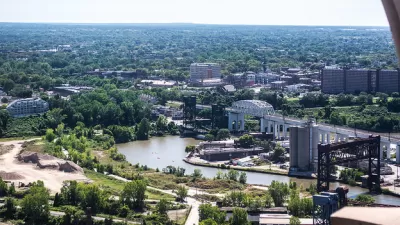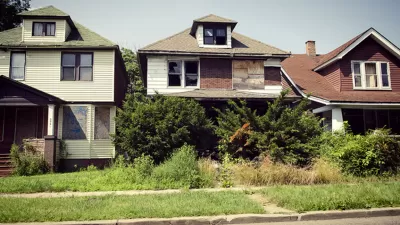The Lincoln Institute of Land Policy is launching the Legacy Cities Initiative to provide a network of support for cities of the country's industrial past.

A new legacy cities initiative launched this week with goals for supporting policy makers, civic leaders, and other stakeholders in cities with industrial pasts and fading middle class prosperity, sometimes called Rust Belt cities. Legacy cities are home to nearly 17 million people and a collective economy of $430 billion.
The Lincoln Institute of Land Policy is launching the initiative, with a new website and a request for expressions of interest in participation in the national network of legacy city community leaders.
According to an article by Emma Zehner, Allison Ehrich Bernstein, and Will Jason that announces the new initiative, the initiative will help community leaders in legacy cities "build on their city’s strengths and create a more equitable, sustainable, and prosperous future."
The Legacy Cities Initiative will offer webinars, peer exchanges, new research, and a community of practice of select leaders, who will meet regularly beginning in January 2021, according to the announcement.
FULL STORY: Lincoln Institute of Land Policy Launches Legacy Cities Initiative

Planetizen Federal Action Tracker
A weekly monitor of how Trump’s orders and actions are impacting planners and planning in America.

Congressman Proposes Bill to Rename DC Metro “Trump Train”
The Make Autorail Great Again Act would withhold federal funding to the system until the Washington Metropolitan Area Transit Authority (WMATA), rebrands as the Washington Metropolitan Authority for Greater Access (WMAGA).

DARTSpace Platform Streamlines Dallas TOD Application Process
The Dallas transit agency hopes a shorter permitting timeline will boost transit-oriented development around rail stations.

LA County Creating Action Plan to Tackle Extreme Heat
Los Angeles County is creating a Heat Action Plan to help communities stay safe during extreme heat, with steps like adding more shade, improving buildings, and supporting the neighborhoods most at risk.

Maryland Plans Quick-Build Complete Streets Projects
The state will use low-cost interventions to improve road safety in five Maryland counties.

Downtown Los Angeles Gears Up for Growth
A new report highlights Downtown L.A.’s ongoing revival through major housing projects, adaptive reuse, hospitality growth, and preparations for global events in the years ahead.
Urban Design for Planners 1: Software Tools
This six-course series explores essential urban design concepts using open source software and equips planners with the tools they need to participate fully in the urban design process.
Planning for Universal Design
Learn the tools for implementing Universal Design in planning regulations.
City of Charlotte
Municipality of Princeton
Roanoke Valley-Alleghany Regional Commission
City of Camden Redevelopment Agency
City of Astoria
Transportation Research & Education Center (TREC) at Portland State University
US High Speed Rail Association
City of Camden Redevelopment Agency
Municipality of Princeton (NJ)





























